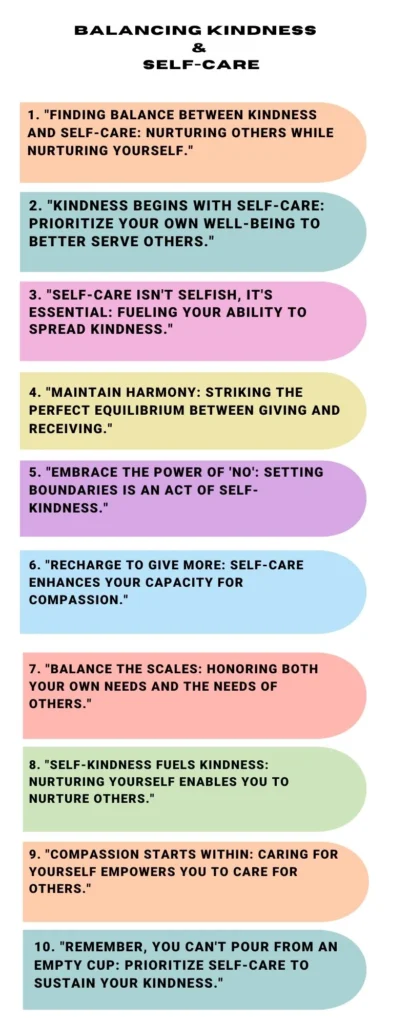Beginning with Good People & Superheroes
In the corporate world, when a genuinely kind-hearted individual begins their journey, they often find themselves constantly saying yes to others’ requests in an effort to be helpful. However, this kindness is frequently exploited as many individuals take advantage of their generosity by continuously asking them to take on additional tasks. It’s a culture that applauds selflessness and kindness, but what happens when this kindness becomes a burden? When saying yes to everyone else means saying no to ourselves?
Many of us fall into the trap of believing that constantly saying yes and being the go-to person for everyone’s needs is not just a virtue but a necessity. We fear that if we were to say no, we’d be letting others down, causing disappointment, or worse, being seen as selfish. But in this pursuit of being the ultimate helper, we often forget the most important person in the equation – ourselves.
The question then arises: does the world need superheroes who shoulder everyone’s burdens without a second thought, or does it simply need good people who know when to draw the line? Is it selfish to prioritize our well-being, to take the time we need to rest and recharge after a long day of work?
In this blog, we delve into the complexities of being kind-hearted in a world that demands constant availability. We explore the dangers of overextending ourselves, the impact of saying yes when we should say no, and the importance of self-preservation in the face of relentless demands.
Join us as we navigate the delicate balance between altruism and self-care, and discover why protecting our own well-being is not selfishness but a important right we all deserve. It’s time to rethink the narrative of what it means to be truly kind and compassionate in today’s demanding corporate landscape.
What we want to say –
1. Understanding between Selflessness and Self-Preservation and Selfishness:
– Selflessness:
This is when you care about others and put their needs before your own. For example, helping a friend even if it inconveniences you because you genuinely want to support them.
Self-Preservation:
This is about taking care of yourself and making sure your own needs are met. It’s like putting on your oxygen mask first in an airplane emergency before helping others, because if you don’t take care of yourself, you won’t be able to help anyone else.
Selfishness:
This is when you only care about yourself and don’t consider others’ needs or feelings. For instance, always taking the last piece of cake without asking if anyone else wants it.
2. The Fine Line between Selflessness and Self-Preservation

Identifying the fine line between selflessness and self-preservation is crucial for maintaining a healthy balance in the corporate world.
While being kind-hearted and helpful is admirable, it’s equally important to recognize when our actions are leading us towards burnout and exploitation.
a. How to Identify It
One way to identify this line is to pay attention to our physical and mental well-being.
Are we constantly feeling exhausted, overwhelmed, and stressed due to taking on too much work?
Do we find ourselves sacrificing our own needs and priorities for the sake of helping others?
These are red flags that indicate we may be crossing the boundary between selflessness and self-preservation.
b. Some instances which highlight the need of the Line
1. Undervalued Helpfulness:
Employees known for their kindness often take on extra tasks without recognition or support, leading to feeling overburdened and undervalued.
2. Neglecting Personal Well-Being:
Prioritizing work commitments over self-care, such as skipping breaks or working long hours, can harm health and productivity.
3. Exploitation of Goodwill:
Kind-hearted individuals may be exploited by being given excessive tasks, working overtime without compensation, or being blamed for others’ mistakes. Learning to say no is essential to avoid exploitation.
c. When to Draw This Line
Knowing when to draw this line is crucial for our well-being.
It’s important to set boundaries and learn to say no when necessary, without feeling guilty or selfish.
Drawing the line means prioritizing our own needs, setting realistic expectations, and communicating effectively with others about our limitations.
Additionally, if you notice that colleagues are taking advantage of our good and gentle behavior, using us solely for their benefit, it’s a clear sign that we need to assert ourselves and establish boundaries to protect our well-being.
d. The Burden of Being “Too Good”:
We may extend ourselves more for genuine needs, we should never allow our goodwill to be taken advantage of by selfish or greedy individuals in the workplace.
While it’s important to assist those genuinely in need, it’s equally crucial not to feel obligated to constantly be available for everyone, especially if it compromises our well-being.
Constantly saying yes to every request, even when it exhausts us and deprives us of personal time for rest and rejuvenation, can lead to burnout and resentment.
Therefore, finding a balance where we can extend a helping hand without sacrificing our own health and happiness is essential for maintaining a healthy and sustainable approach to kindness.
e. The Balance of Kindness and Self-Care:
Being kind involves helping those in genuine need without overextending ourselves, especially for those who may take advantage of our generosity for their own selfish ends. It’s important to remember that being good doesn’t require us to constantly cater to every demand from colleagues.
While we should always lend a hand to those truly in need, we shouldn’t bear the burden of others’ expectations or judgments if we prioritize our well-being by taking breaks and caring for ourselves.
Constantly agreeing to everything, even when it strains our personal well-being, can lead to burnout and resentment. Striking a balance ensures that we can continue helping others while also safeguarding our own health and happiness.

f. The Importance of Self-Care:
Caring for oneself is not selfish; it’s a implicitly fundamental right.
Unlike any superhero in fiction, take care of ourselves. It is most essential component of good and happy life.
g. The Significance of Saying No to Overburdened Work
Saying no to overburdened work is not selfish; it’s a form of self-protection. Saying no to overburdened work is crucial for maintaining a healthy work-life balance. It allows us to prioritize tasks effectively, focus on high-priority assignments, and avoid burnout.
Never saying no can have serious consequences on our health and happiness.
This can lead to exhaustion, a lack of time for self-care, fatigue, decreased productivity, increased stress levels, anxiety, feelings of overwhelm, decline in overall health and ultimately, burnout.
By learning to say no when necessary, we can prioritize our tasks effectively and avoid taking on more than we can handle. By setting boundaries and knowing our limits, we can prevent ourselves from taking on more than we can handle, leading to improved productivity and well-being.
h. The Mindset of Always Saying Yes to Others’ Requests
The mindset of always saying yes to others’ requests can stem from a desire to please, fear of disappointing others or letting people down, or a lack of assertiveness, or a belief that saying no is selfish
However, this mindset often leads to negative consequences, such as neglecting our own needs, sacrificing personal time, and experiencing increased stress and anxiety and even burnout, exhaustion, and resentment.
It’s important to recognize the impact of this mindset and learn to assert ourselves by saying no when necessary.
i. Setting Boundaries Leads to Better Health
Setting boundaries and learning to say no can have positive effects on our mental, physical, and psychological health.
For example, prioritizing tasks and saying no to overburdened work can reduce stress levels, improve productivity, and enhance overall well-being.
Additionally, setting boundaries in personal relationships and colleagues can lead to healthier dynamics reduce stress levels and improved productivity and self-esteem.
Overall, learning to say no is a valuable skill that contributes to a healthier and more balanced life.
j. Beware of Overextending:
Risks at constantly available 24/7
Being constantly available 24/7 and never refusing requests can have significant risks. It can lead to exhaustion, burnout, and a lack of personal time for rest and rejuvenation.
This continuous availability may also create unrealistic expectations from others, causing stress and anxiety as one struggles to keep up with the demands. This can not only impact our mental and physical health but also erode our sense of self-respect and autonomy
Losing self-respect
Losing self-respect and becoming a target for exploitation are direct consequences of overextending oneself.
When one consistently says yes to everything, regardless of personal limits or needs, it can erode self-esteem and self-worth because when we constantly say yes without considering our own well-being, we send a message that our time and boundaries are not valuable.
This can make individuals more susceptible to being taken advantage of by others who exploit their willingness to help.
h. Dos and Don’ts for Being a Good Person Without Being Selfish
Dos:
-Set boundaries and learn to say no when necessary.
-Prioritize self-care, including rest, relaxation, and activities that bring joy.
-Advocate for your own needs and rights without guilt.
-Practice empathy and kindness.
-Provide help only when truly needed.
-Clearly define your responsibilities and limits. Communicate your limits and say no when necessary.
-Maintain job quality and prioritize personal happiness.
-Encourage assertiveness in saying no and standing up for oneself while maintaining respect and politeness.
-Learn to say no politely but firmly.
Don’ts:

– Sacrifice your well-being for others’ approval or convenience.
– Neglect self-care in the pursuit of constantly helping others.
– Hesitate to say no when it’s in your best interest.
– Overextend yourself to the point of exhaustion.
– Neglect your own needs for the sake of others.
– Taking on all unnecessary responsibilities.
and finally, don’t be available at all times; prioritize your own well-being.
3. Points to be remember
– Always distinguish between being a good person and being taken advantage of, stressing the importance of self-awareness. Advocate for self-care, setting boundaries, and maintaining self-respect in both professional and personal spheres.
– Encourage yourself for prioritizing well-being while offering assistance, avoiding the risk of being overused by others and emphasize that being good doesn’t equate to being a doormat; it’s about finding a balance between helping others and self-preservation.
-Remember significance of knowing when to say no for one’s own mental, physical, and psychological health, ultimately leading to a healthier and more balanced life.
Conclusion:
In conclusion, good people who genuinely care and contribute within their own healthy limits are indeed more valuable than any “superhero.” Unlike those who push themselves endlessly to be seen as “good” in others’ eyes—saying “yes” to everything and taking on every request—these individuals are less likely to face the exhaustion and burnout that come with exceeding personal limits.
By recognizing and honoring one’s boundaries, they maintain a sustainable path of kindness and effectiveness. Setting these limits also reduces the fear of disappointing others over time, as it prevents the unhealthy buildup of unrealistic expectations that they will handle everything. Real value lies in steady, authentic contributions that don’t compromise personal well-being, proving that true strength comes from self-respect and balanced generosity.
“Finally, be human; strive to be a good human, but avoid trying to be a superhuman or superhero.”
Why This Product Deserves Your Attention
At calmandcompose.com, our goal is to promote peace of mind and stress-free living. To support this, we recommend a couple of products that align perfectly with the blog’s theme. The book Reality Hunger: A Manifesto by David Shields encourages a mindful approach to life, while the silk eye mask promotes relaxation and a restful sleep, both of which are vital in combating stress and burnout.
If you’re curious about Why These Products Deserve Your Attention, you can explore a comprehensive review of both items on our partner site awareandbeware.com. The review dives into all aspects, including their features, benefits, and any potential drawbacks, helping you make a fully informed decision. I encourage you to check it out for a deeper understanding of how these products can help you maintain your well-being and lead a balanced life.



